The Seaweed and Integrated Multi-Trophic Aquaculture (IMTA) Research Laboratory of
Dr. Thierry Chopin
Using IMTA to treat dementia...an unexpected application of IMTA
August, 2012
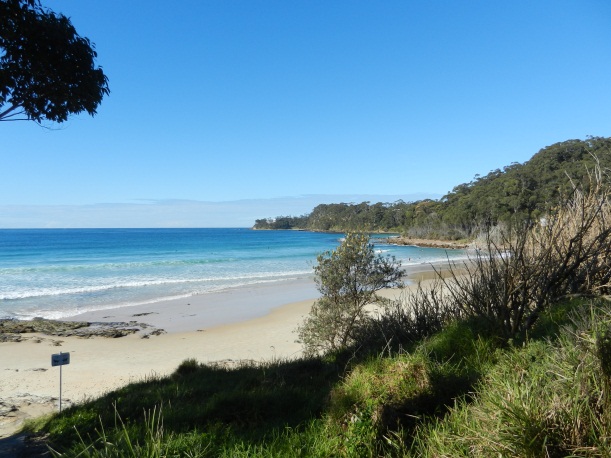
Before being a plenary speaker at the 8th Asia-Pacific Conference on Algal Biotechnology, in Adelaide, Australia, in July 2012, Thierry Chopin spent a few days with Pia Winberg, Director of the Shoalhaven Marine and Freshwater Centre from the University of Wollongong and the new “Seaweed Dame of Australia”. The few days spent at Narrawallee were relaxing [beautiful, warm (by Canadian standards!), sandy beach, even in the middle of the Australian winter!] and most instructive, as Pia was explaining her different projects.
One day, Pia took Thierry to the Royal Freemasons’ Benevolent Institution (RFBI) Basin View Masonic Village for a most surprising visit. Denise Leroy, General Manager of the care hostel, with the assistance of Paul van der Werf of EarthanGroup, has developed a freshwater IMTA system for her patients who suffer from different types of dementia. So, we were in the presence of a new application for IMTA: Dementia Treating Integrated Multi-Trophic Aquaculture, or DTIMTA. A remarkable idea that works amazingly well!
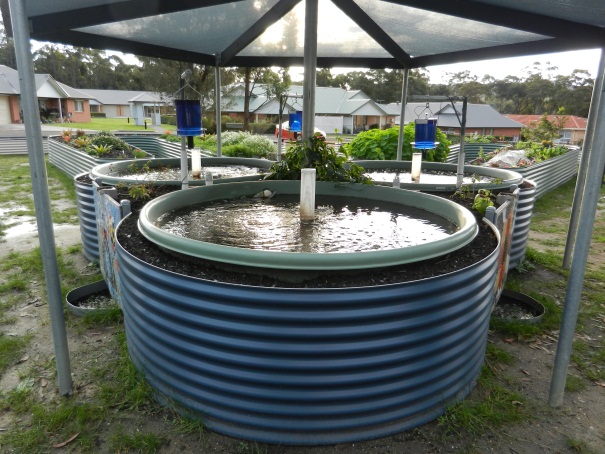
The RFBI Basin View Masonic Village opened in 1998, first with independent living units (self-care); the hostel opened in 2005. Denise became the General Manager of the institution in 2009. She presented the DTIMTA idea to the Auxiliary as a project they may be interested in supporting: a self-sustaining community garden based on the innovative principles of aquaponics. The Auxiliary and the RFBI became very interested in the project, as it was strongly resident focused and unusual, and they promptly decided to fund it, after being impressed by Denise’s passionate attitude. The construction started in early December 2011 and the system was operational for Christmas with gold fish, yabbies (that’s crayfish in Australian vernacular) and many types of plants (vegetables, spices and flowers).
Initially, they envisioned 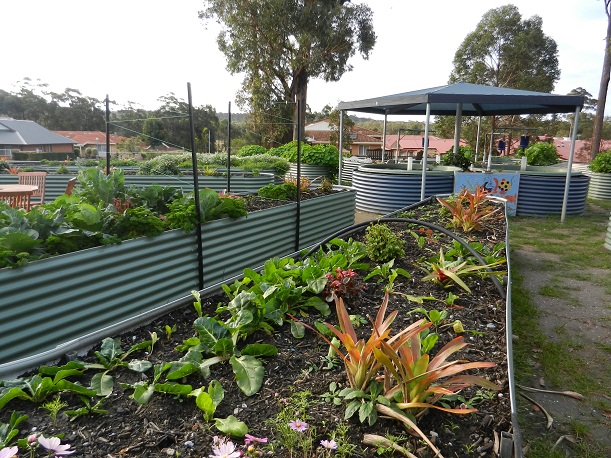 sociological, physiological, therapeutic, spiritual and environmental benefits for the people involved in the project. These benefits would be achieved through the provision of:
sociological, physiological, therapeutic, spiritual and environmental benefits for the people involved in the project. These benefits would be achieved through the provision of:
•opportunities for all participants to engage in constructive, productive and therapeutic recreational activities,
•potential occupational therapy opportunities generated by activities in and around the garden,
•a way of retaining some aspects of earlier lifestyles for our aging population,
•an increased sensory, physical and emotional environment, and a variety of experiences for those with dementia,
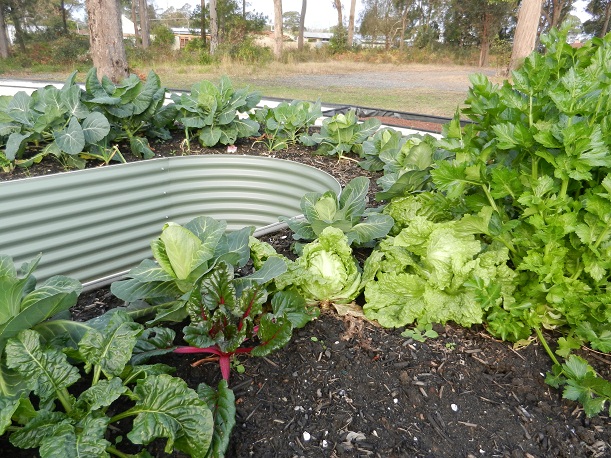
•access to fresh nutritious food,
•sense of achievement from meaningful and productive activities,
•an improved environment for those who live here,
•a safe and pleasant location where families and friends can gather, and
•a place to socialise and reminisce.
As a result of preliminary research into this project, Denise Leroy and her team identified potential for research and education, community links and interdisciplinary studies. The implications are that this will lead to an improved lifestyle for the residents and others and the promotion of a positive image of the Village and the RFBI.
After less than a year of existence, Denise and her team have noted the following responses and effects on their patients:
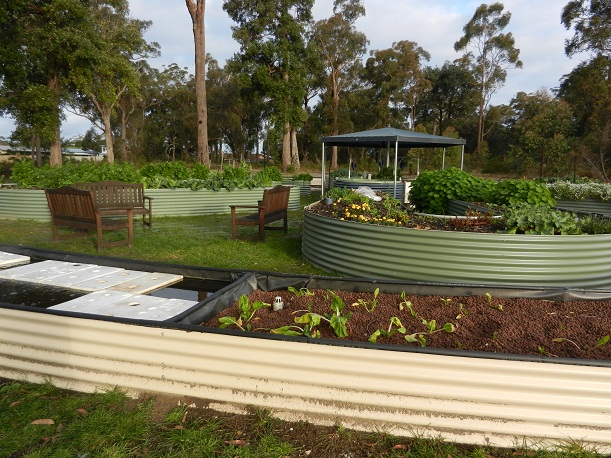
• Individual responses are different but always positive; no negative response has been recorded.
•The more significant the dementia the more basic the response is, but patients always respond.
•This activity is, in fact, crucial for their mental and physical health.
•It provides fresh air and exercise. The patients are away from some of the indoor “smells” and “busy inside noises”.
•It provides a calming environment and reduces agitation. The comments most often made are “I feel the wind on my face”, “it’s calming”, “it&38217s cool and restful”. One lady, who never verbally communicated in the past, actually said “very calming” to the great astonishment of the team.
•Most people in care are vitamin D deficient and this vitamin cannot be synthesised in in-door environments. Being outside will increase vitamin D intake and synthesis, with positive effects on bone health, reduced incidence of some cancers, reduced incidence of multiple sclerosis (MS), reduced incidence of depression, improved cognitive performances in patients with Alzheimer’s disease, and reduced risk of cardio-vascular events.
•With the assistance from relatives, friends and staff the existence of the garden increases the ability for patients with dementia to go outside and to have more freedom and independence (unrestricted walk around).
• The garden is a space which facilitates activities and extends the range of activities.
• Patients enjoy sitting, watching animals (kangaroos are never very far in Australia!), and attracting and feeding birds. Many have spent their lives relating to nature.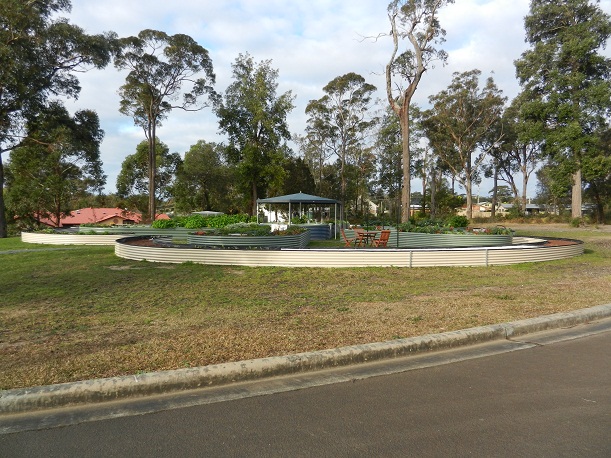
• The place provides a stimulus for conversation and is busy enough to provide watching activities: there is a nearby car park, a road, activities at other resident houses, and deliveries.
• Something to do and meaningful and tailored activities are good therapy programmes to manage neuropsychiatric behaviours in persons with dementia and to reduce care-giver burden.
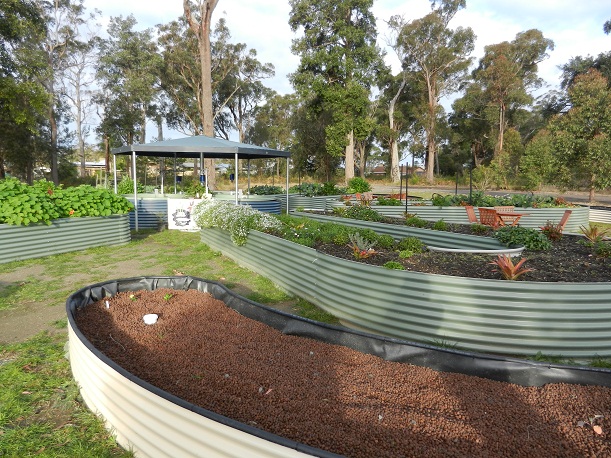
•The design of the DTIMTA system is also very important. Patients walk along the different components of the system. There are no visual barriers and they are on a “voyage”: there is something to stop, look at or do with every step on a continuous trip.
• Finally, there are good and healthy food products for the kitchen that the patients are proud to have cultivated, harvested and delivered.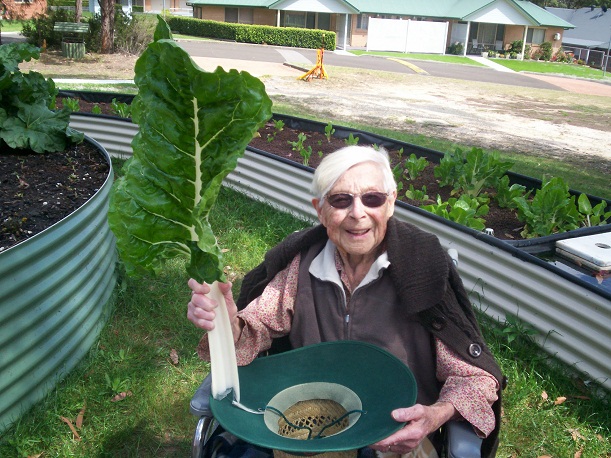
Catherine, 102 years old, having morning tea in the DTIMTA garden and proudly displaying her food production. Catherine lives in the hostel, while her daughter, Doreen, lives in the self-care villas.
Visiting this DTIMTA system was a most inspiring, refreshing and enlightening moment. The discussion with Denise Leroy was most interesting. If one day you go to Jervis Bay, in New South Wales, try to make a detour through Basin View and see to what extent the IMTA concept has been put to good use.
The Royal Freemasons’ Benevolent Institution
Basin View Integrated Aquaponic System
The pictures on this page, and throughout the entire website, are property of their owners. As such, they cannot be used, or reproduced, without their expressed consent.
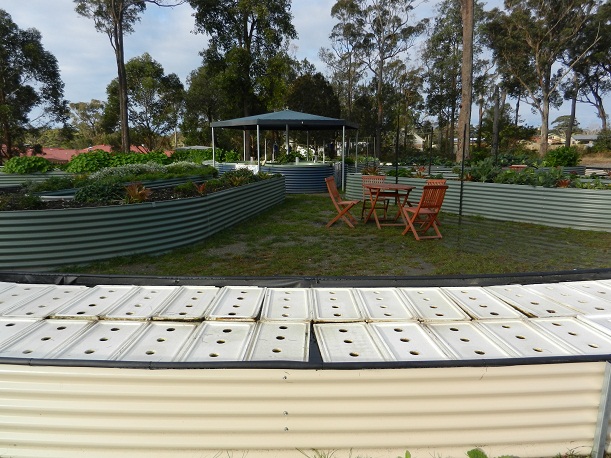
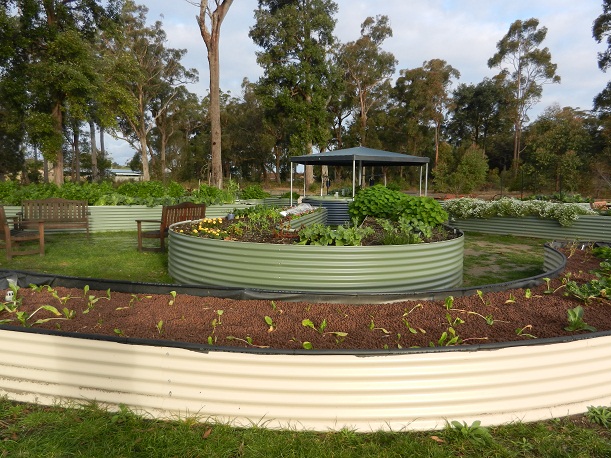
 Accessible Version
Accessible Version